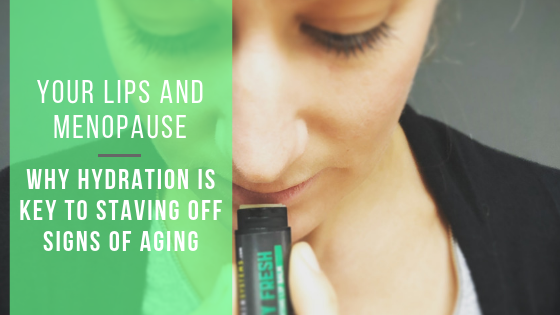In their mid-to-late forties or early fifties, women’s bodies gradually decrease the production of estrogen and progesterone, two important hormones that control fertility and menstrual cycles.
We often hear about the most common consequences of these hormonal fluctuations, such as sporadic menses, hot flashes, weight gain, and mood swings. For many women, menopause can also have a direct impact on skin health, most notably in the lips and mouth area.
Here’s what you need to know about this often-overlooked aspect of skin aging.
A mouth in pain
- As they age, many women begin to experience a variety of new, disturbing oral health issues:
- Burning and pain in the oral cavity and surrounding areas
- Early onset of osteoporosis in the skull and jawbone, causing soreness in the gums
- Decreased volume of saliva
The tissues of the lips are also affected, both from direct hormonal changes and indirect actions caused by oral discomfort.
For example, women often slow down their intake of food and water because of perimenopausal weight gain. Hormonal changes and dehydration cause the lip tissue to degrade, become dry and lose elasticity.
Medical conditions that make matters worse
A wide range of health problems can make a woman's battle to keep her lips healthy and youthful-looking even more difficult.
For instance, many older women who take medications for chronic health conditions experience thinning skin and dry mouth. Vitamin deficiencies, spicy foods, and lip biting can also exacerbate damage to the lips during menopause.
Additionally, the immune system may start to malfunction, which can result in infections. If a woman has the herpes simplex virus or oral thrush, she might develop cold sores, blisters, patches, or other skin issues along with peeling and pain.
Even healthy lifestyle choices such as regular fitness workouts can cause problems. Some women unknowingly damage their lips while exercising by biting on them or by allowing their bodies to dehydrate.
All of these conditions can make the lips feel hot and hypersensitive. Thankfully, there are a number of simple steps that can be taken to rejuvenate and treat sore, cracked lips.
A plan to reclaim your lips
Start by treating the underlying conditions and problems that may be causing damage to your lips.
According to recent studies, antioxidants such as glutathione can help improve the skin’s appearance. Favor antioxidant-rich foods, and make sure you’re getting all the vitamins and minerals you need.
Speak with your doctor about ways to improve your overall health:
- Get tested for nutrition deficiencies, especially vitamin B, iron, and zinc
- Use antibiotics, antifungal medication, or prescription symptom relievers if you have active sores or infections
- Alleviate symptoms of menopause by taking prescription, supplemental, or plant-based estrogen enhancers
It’s also important that you improve your total body hydration at home, work, and play by drinking more water and beverages containing electrolytes.
If you can't stop licking or biting your lips during workouts, give them a bit of love by coating them with a thick, beeswax-based lip balm that prevents you from directly licking the skin.
Make certain that it also contains natural products like grape seed oil, shea butter, and Vitamin E so you're actually conditioning and moisturizing the skin during your workouts.
If you also have a lip-biting habit, invest in a mouth guard that blocks your tongue and teeth from touching your lips. Finally, since sunlight can cause lip damage, make certain to always wear lip balm or lipstick that contains SPF whenever spending any significant amount of time outdoors.


Leave a comment: